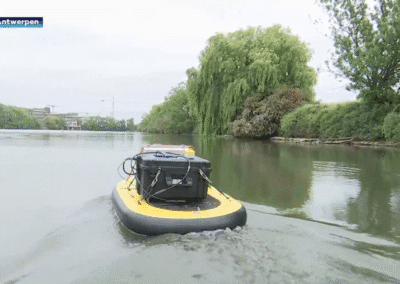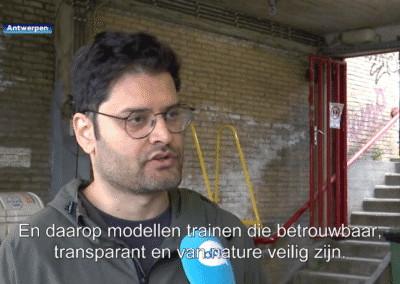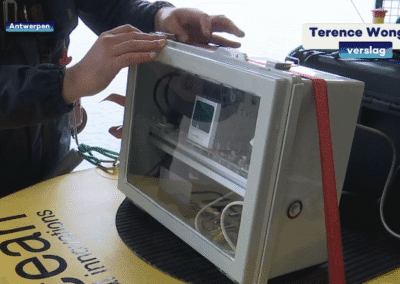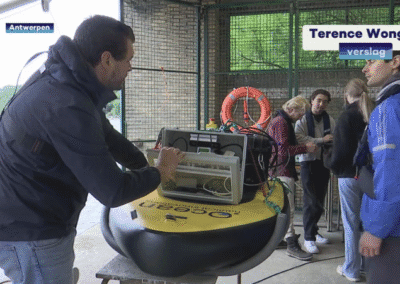In the end of May 2025, our project partners from the University of Antwerp (UAntwerpen) put artificial intelligence to work on the pond at the Antwerp Maritime Academy. Their mission: to train a small AI-powered boat to steer safely and autonomously—collecting vital visual data along the way.
In the words of project lead Dr. Ali Anwar of UAntwerpen’s IDLab:
“We equip the boat with LiDAR sensors and RGB‑D cameras so it gains ‘depth vision’, allowing it to detect obstacles and avoid collisions safely.”
The AI model has two training phases: first, real-world trial runs on the pond—and second, simulation exercises replicating conditions in the Port of Antwerp Bruges. Analogous to flight training, this dual system lets the AI build competence in a controlled environment before deploying on actual waterways.
Here’s a translation of a snippet from the accompanying TV report:
“They learn to steer a safe course on their own”—a short clip that highlights how the boat recognizes buoys and obstacles, then adapts its path dynamically.
The team is amassing rich data—GPS, sensor logs, motor telemetry—to refine their AI model. Dr. Anwar notes the scarcity of open-source maritime datasets, making their own testing crucial:
“We collect our own sensor data during real world trials, and we plan to open-source it for anyone to use.”
This project relates to the UAntwerpen’s Solar Boat Team, which has been evolving its solar-powered vessels annually to enhance efficiency and competitive edge. This year’s model, the Torpedo Mk II, was modified significantly for the Monaco Energy Boat Challenge, aiming for full autonomous navigation using AI. Team UAntwerpen has won this year’s Solar Boat Challenge in the AI class.
As Bram Dupré from Solar Team UAntwerp explained to VRT News:
“Today we’re mainly testing how to avoid the buoys. The programming is not easy, but I think we’ll be able to achieve a good result in the end.”
And Toon Lambers, the team leader, emphasized the integration challenge:
“Each piece works individually… but putting the puzzle together is one of the most difficult parts of the project. But it’s very interesting to be a part of.”
Link to reportage: https://www.gva.be/atv/ingenieurs-van-uantwerpen-leren-bootjes-varen-met-artificiele-intelligentie/69141470.html
🔍 Why it matters?
- Safety and autonomy on the water: The project showcases how AI—using LiDAR, cameras, GPS—can enhance maritime navigation and reduce risks.
- Energy efficiency and sustainability: These solar-AI hybrids aim to match or surpass their solar power production using optimized energy management.
- Building open-source maritime data: By sharing datasets, UAntwerpen is enabling wider research in autonomous shipping.
- Real-world testing + simulation: The dual training structure accelerates learning and minimizes hazards during development.
What comes next?
The Antwerpian solar boat team has recently participated in the Monaco Energy Boat Challenge (July 1–5), where their Torpedo Mk II competed in the AI-guided tasks like obstacle slalom, autonomous docking, and buoy navigation. The team was placed first in the AI class.
Note for publication:
- All quotes and facts above are sourced from VRT NWS, The Brussels Times, HLN.be, and UAntwerpen’s press releases.





